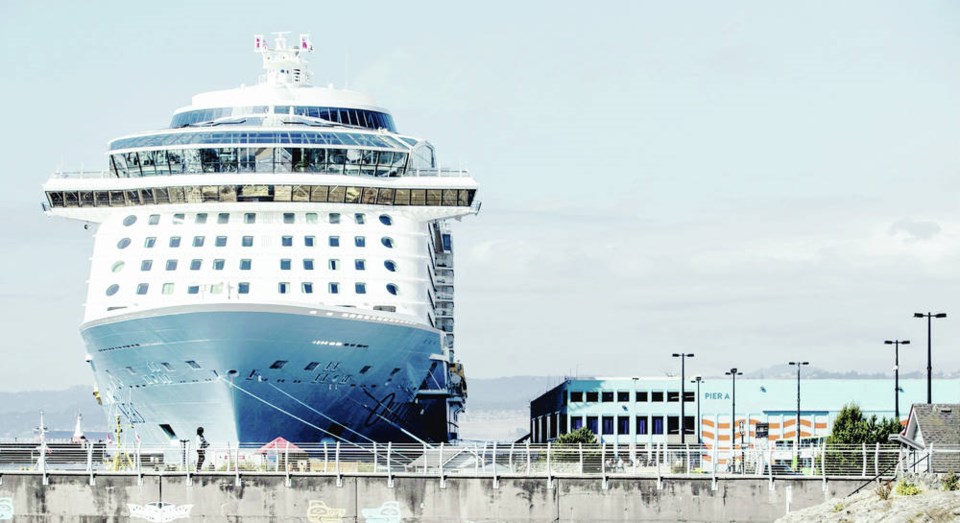Victoria may find out in the next year whether cruise ships come here because it’s pretty, or just because they have to by law.
And it’s an open question as of Tuesday whether the B.C. government is thinking ahead to that point, judging by Tourism Minister Melanie Mark’s responses on the issue in question period in the legislature.
Mark brushed off alarms raised by Opposition Liberals and said the government is totally focused on the rollout of vaccines. She said border decisions and cruise ships are a federal issue.
B.C. is advocating in Ottawa for a “robust return” of the ships when it’s safe to do so, she said. But there was no detailed response about recent developments in Alaska. Leaders there were frustrated earlier this year when Ottawa extended the cruise-ship ban for another year — to February 2022 — without consulting them.
One of their responses could raise questions about the future of the lucrative business in Victoria, Vancouver and Prince Rupert past the end of the pandemic. This month, Alaska’s congressional delegation introduced the Alaska Tourism Recovery Act, which would change the law to allow the ships to skip the Canadian stops.
The stopovers are a requirement in a law designed to protect the U.S. shipbuilding industry, by barring all foreign-flagged ships with passengers from sailing between U.S. ports.
Virtually all the ships on the Alaska tourism run are foreign-flagged, so they have to stop at a B.C. port. There were 264 stopovers in Victoria in 2019, the last season before Ottawa shut down the ports due to COVID-19.
The proposed exemption is framed as a temporary measure. It’s aimed at salvaging some of Alaska’s upcoming tourism season. It would require several revisions of other pandemic measures before ships could sail.
But if it came into effect and proved successful, what if it became permanent? The protectionist clause in the U.S. Passenger Vessel Services Act — known as the Jones Act — is 101 years old and considered by some to be an archaic leftover.
If it was discarded even after the pandemic, Victoria would have to stand or fall as a stopover on its own merits. The town has its charms as a port of call. But city council is already dubious verging on antagonistic toward the industry on environmental grounds. Some in James Bay are openly hostile.
As for the B.C. government, it’s hard to tell. Asked specifically about the danger of the exemption becoming permanent, Mark ducked the question. “The federal government is in charge of our borders … Right now our focus is on the rollout of our vaccinations.”
Liberal critic Mike de Jong said the point is that when the border does open up, cruise-ship passengers might not be coming here anymore.
The Alaska leaders wrote several letters to Prime Minister Justin Trudeau about the issue and expressed “shock” at the extension of the shutdown. They also copied Premier John Horgan in correspondence seeking engagement on the matter.
“Now they’ve upped the ante,” said de Jong. “It could cost our struggling tourism sector hundreds of millions of dollars every year.”
He asked in the house if Horgan had responded to the Alaskan congressional delegation. “Has he written to the Alaska congressional delegation? Has he engaged with them? If not, why not?
“The stakes for B.C.’s tourism sector are incredibly high and require engagement by this government.”
There was no immediate answer.
Ian Robertson, CEO of the Greater Victoria Harbour Authority, has been tracking the Alaskan proposal. He said a temporary or permanent exemption from the legal requirement to dock in Canada has a low probability of being enacted.
But B.C. has to get involved in talks with Ottawa on reopening the border. “They don’t have a plan at this point. There is no plan.”
B.C. should be starting talks with federal authorities in order to send a signal to Alaskans that authorities here are looking forward to welcoming visitors.
As it stands, Canada cancelled the industry for a year with near unanimity that it was the right thing to do. Then it cancelled it for another year and got objections from Alaska about how that was handled.
Now the U.S. House has an idea on the agenda about bypassing Canada entirely for the duration. Even if it’s got little chance of passage, B.C. needs to handle this carefully.



